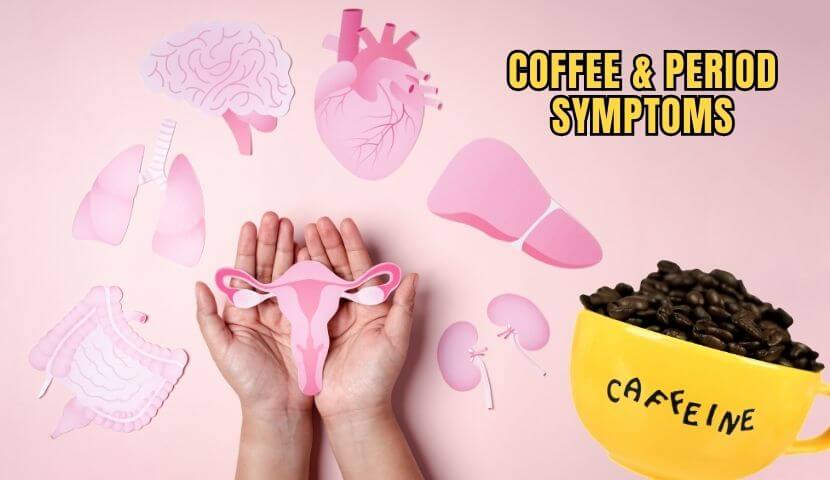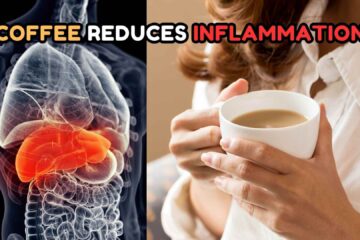For many of us, coffee is non-negotiable. It gets us going in the morning, helps us power through a mid-day slump, and — let’s be honest — it’s comforting. But if you’ve ever wondered whether your favorite cup of joe might be making your period heavier or your cramps worse, you’re not alone. Many people who menstruate are asking the same question.
Let’s dig into what science says about coffee and menstruation, and whether caffeine really affects your menstrual flow, period symptoms, or hormone levels during menstruation.
Understanding the Basics: How Caffeine Works

What is caffeine and what does it do?
Caffeine is a natural stimulant found in coffee, tea, energy drinks, and even some over-the-counter medications. It works by stimulating the central nervous system, which increases alertness and temporarily wards off drowsiness. This is why it’s a go-to for so many people in the U.S., where the average adult consumes around 135 mg of caffeine daily — roughly the amount in one 12 oz cup of coffee.
But beyond that burst of energy, caffeine also triggers several physiological responses:
- Vasoconstriction: narrowing of blood vessels
- Increased heart rate and blood pressure
- Heightened adrenal activity (think: fight or flight mode)
- Diuretic effects (makes you pee more)
- Gastrointestinal stimulation
These effects can indirectly impact your menstrual cycle, especially if you consume a lot of caffeine regularly.
Caffeine and the Menstrual Cycle: What’s the Connection?
Can caffeine change your period?
While caffeine doesn’t cause menstruation, it can influence the way your body handles it. Research is ongoing, but studies suggest caffeine may:
- Influence estrogen and progesterone levels
- Increase uterine contractions
- Intensify PMS symptoms
- Alter blood vessel behavior in the uterus
- Interfere with iron absorption, possibly increasing the risk of anemia during period
In simpler terms, caffeine might make periods feel worse, especially for those already prone to heavy or painful periods.
Does Coffee Make You Bleed More on Your Period?
What the research says
There isn’t a definitive “yes or no” answer — but there are patterns. One study in the Journal of Taibah University Medical Sciences found that high caffeine intake was associated with prolonged and heavier menstrual bleeding in some women.
Another study published in the American Journal of Epidemiology observed that caffeine could actually shorten the duration of menstruation for some — though the results were less consistent.
So what’s the takeaway? It likely depends on your individual sensitivity to caffeine and your unique hormone profile.
Why Coffee Might Make Period Symptoms Worse

1. Increased Uterine Contractions
Caffeine stimulates the smooth muscles in your body — including the uterus. This can lead to more frequent or stronger uterine contractions, which may feel like worse menstrual cramps.
2. Elevated Estrogen Levels
Some studies suggest that caffeine intake can raise estrogen levels, especially in people of Asian and white ethnic backgrounds. Elevated estrogen can thicken the endometrial lining, potentially resulting in heavier bleeding when it sheds.
3. Dehydration and Bloating
Because caffeine is a diuretic, it can lead to dehydration. This may make symptoms like bloating, fatigue, and cramping worse during menstruation. Proper hydration during periods helps manage these issues more effectively.
Caffeine Sensitivity and Menstruation
Everyone reacts differently
Some people can drink coffee all day and sleep like a baby. Others sip one small latte and feel jittery, anxious, or nauseous. This is caffeine sensitivity, and it plays a huge role in how coffee affects your period.
If you’re sensitive to caffeine, even a small dose could cause:
- Increased irritability (worsening PMS symptoms)
- Elevated heart rate or anxiety
- Worsened menstrual cramps
- Digestive issues during menstruation
If you think caffeine might be impacting your period, consider tracking your caffeine intake along with your cycle symptoms.
Caffeine Withdrawal and Period Discomfort
If you’ve ever tried to give up coffee suddenly, you know about caffeine withdrawal: headaches, brain fog, mood swings, and irritability. Now imagine those symptoms on top of your usual period symptoms — not fun.
Gradually reducing caffeine intake (instead of quitting cold turkey) can help minimize withdrawal effects and make it easier to determine if your body feels better during your period without it.
The Iron Link: Caffeine and Anemia During Period
Can coffee lead to iron deficiency?
Heavy periods can cause iron deficiency, which can lead to fatigue, dizziness, and even shortness of breath. On top of that, coffee and tea contain compounds called polyphenols and tannins that interfere with iron absorption.
If you’re already losing iron through heavy menstrual bleeding, drinking coffee with meals can reduce your body’s ability to replenish iron stores. To combat this:
- Avoid coffee/tea 1 hour before or after meals
- Pair iron-rich foods with vitamin C
- Ask your doctor about iron supplements if you’re prone to low iron or anemia
Should You Avoid Coffee on Your Period?
You don’t have to quit coffee forever, but you might benefit from cutting back a little, especially if you’re dealing with:
- Heavy menstrual bleeding
- Severe menstrual cramps
- Bloating or dehydration
- Mood swings or anxiety
- Iron deficiency or low energy
Instead of quitting coffee entirely, try:
- Switching to half-caf or decaf
- Limiting coffee to 1 small cup per day
- Opting for herbal teas with anti-inflammatory benefits like ginger or chamomile
- Drinking more water-rich foods (like cucumbers, oranges, watermelon)
Best and Worst Drinks During Menstruation

What to drink:
- Water: Stay hydrated to ease bloating and cramps
- Ginger tea: Natural anti-inflammatory properties
- Chamomile tea: May reduce pain and promote sleep
- Warm lemon water: Helps with digestion and hydration
What to limit:
- Coffee and espresso drinks
- Sodas and sugary energy drinks
- Alcohol: Can worsen dehydration and cramps
- Cold dairy drinks: May trigger inflammation in some
Natural Remedies and Diet Tips for Heavy Periods
A few lifestyle changes can go a long way in managing heavy menstrual bleeding and other symptoms:
Anti-Inflammatory Diet
- Eat more: leafy greens, berries, turmeric, chia seeds, salmon, flaxseed
- Eat less: processed foods, red meat, fried food, high-sugar snacks
Supplements to Consider (Consult Your Doctor First)
- Magnesium: May reduce cramps
- Vitamin B6: Supports hormone balance
- Iron: Prevents fatigue from heavy bleeding
Physical Activity
Gentle movement like yoga, stretching, or walking can increase circulation and reduce cramps.
When to Talk to a Doctor
If you’re consistently experiencing:
- Very heavy periods (soaking through pads/tampons in under 2 hours)
- Severe cramps that don’t respond to OTC meds
- Irregular periods or skipped cycles
- Fatigue that won’t go away
It’s a good idea to speak with a healthcare provider. There could be underlying conditions like PCOS, fibroids, or hormonal imbalances that need attention.
Final Thoughts
So, does coffee make you bleed more on your period? For some, yes — especially if they’re sensitive to caffeine or already prone to heavy periods. Caffeine can influence hormone levels, uterine contractions, and even iron absorption, all of which play a role in how your period feels.
But you don’t necessarily have to give up your favorite brew. Try cutting back slightly, staying hydrated, and tracking how your body responds.
Your period is personal — and understanding how caffeine affects your menstrual cycle helps you make choices that keep you feeling your best.

Frequently Asked Questions (FAQs)
Does drinking coffee make your period heavier?
It can, depending on your body. For some people, caffeine increases estrogen levels and uterine contractions, which may lead to heavier or more painful periods. Others may not notice any change at all. If you already experience heavy menstrual bleeding, limiting caffeine might help.
Is it okay to drink coffee during your period?
Yes, in moderation. A small amount of coffee (1 cup a day) is generally fine for most people. However, if you notice worse cramps, bloating, or mood swings after drinking coffee, try reducing your caffeine intake and see how your body responds.
Can caffeine affect period cramps?
Yes. Caffeine is a stimulant that may increase uterine contractions and raise levels of prostaglandins, both of which can worsen cramps. If you’re prone to painful periods, cutting back on coffee could help reduce discomfort.
Does caffeine cause irregular periods?
Not directly, but high caffeine intake may interfere with your hormones over time, potentially leading to menstrual cycle changes in sensitive individuals. Stress, diet, and other lifestyle factors usually play a bigger role in irregular periods.
What can I drink instead of coffee on my period?
Try switching to herbal teas like chamomile, ginger, or peppermint. These are naturally caffeine-free and may reduce inflammation, cramps, and bloating. Warm water with lemon is also a great, hydrating alternative during menstruation.
Should I avoid coffee if I have anemia from heavy periods?
Yes, at least around meals. Coffee can interfere with iron absorption, which is especially important if you already have low iron due to heavy periods. Drink coffee between meals rather than during them, and consider eating iron-rich foods like spinach, red meat, or lentils.
How much caffeine is too much during your period?
Most experts recommend staying under 200–300 mg of caffeine per day — that’s about 1–2 standard cups of coffee. If you notice increased period symptoms, try cutting down gradually and observe how your body reacts.



0 Comments